When you’ve chosen running as a weight loss exercise, it’s important to know that your body weight is determined by more factors than just your level of physical activity. Factors like genetic background, metabolic rate, and most importantly eating habits play an important role. In weight loss or weight gain, your daily diet plays the key role (70%), and whilst the influence of exercise is just 30%.
Running is a wonderful sport to boost your metabolism, but if your goal is to lose weight, it is essential to have a closer look at your daily eating & drinking habits. Some adjustments to your diet will also you feel better while you’re working out and prevent cravings afterward. Changing all of your eating and drinking routines all at once might be very stressful and overwhelming, as for some people this may require a total lifestyle change. Implementing healthy habits and eliminating the unhealthy ones, just one at a time can help you make that switch to a healthier lifestyle step by step.
Clean up your pantry & plan healthy groceries shopping
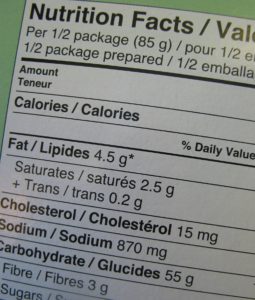
If you want to lose weight, you really need to cut down your sugar intake. Too high sugar levels in your blood will be stored in the body as fat, which will lead to weight increase.
It is hard to stay strong when you’re surrounded by items like candy, biscuits, and other unhealthy snacks, which are tempting you to be consumed. Be aware of processed foods as well. Cans or dry mixes of soups and sauces, soda drinks, and pre-packed fruit juices are usually full of sugars (check their table of ingredients). So, you’d better start cleaning up your pantry and fridge and get rid of them, as these products are your biggest enemy! Needless to say that take away food or convenience microwave diner packs will not support your weight loss goals either.
Instead, stock your fridge with fresh food items, such as fruits and veggies, yogurt, fish, and lean meats. And fill your pantry with whole grains, pulses, nuts, and seeds. These food items will keep your blood sugar levels stable, your cholesterol low and your energy levels right throughout the day (even during and after your runs).
It’s recommendable to plan your grocery shopping: write a shopping list of the items that you need before you head out to the store. This will help you focus on healthy products and not get distracted by all the unhealthy items that are available in store.
In case you are already in the store and you forgot your shopping list, then just keep it simple: MORE FRESH ITEMS & LESS PROCESSED FOODS & DRINKS.
Drink more water!

It is crucial to keep yourself hydrated throughout the whole day. Your body temperature and waste removal from your body are regulated by fluids through urination, perspiration, and bowel movements. About 20 percent of daily fluid intake comes from food and 80 percent from drinks. So drinking enough is very important.
Water is best to keep yourself hydrated and a positive side effect of drinking water regularly is that it prevents food cravings.
How much everybody should drink to stay hydrated depends on several factors, like someone’s overall health and physical activity level. Someone’s geographical location also plays an important role. A tropical environment usually needs a higher fluid intake than a moderate climate. There isn’t one single formula for a daily fluid intake that fits everyone all over the world. In general, it is recommended for adults in moderate weather conditions, to drink minimal 2 liters (8 glasses) of water per day. This is easy to remember and a reasonable goal.
Balanced diet for runners who want to lose weight

Running burns calories and the right training methods can also build more muscle tissue, which increases the metabolism. So that’s great! But no matter how much you run, if your diet is crap, it will still be very difficult to lose weight. We can all do the math here: the amount of calories you consume should be lower than the number of calories that you burn. But for effective and healthy weight loss, you really need to be very selective on which products you choose to have.
Your daily intake needs to contain the right mix of nutrients to feel energized throughout the day, and especially during and after your workouts. This will also help you stay injury-free.
Balanced meals for runners should comprise approximately:
- 50 percent complex carbohydrates: Whole grains, like brown or wild rice, oatmeal, whole-grain barley, or bulgur. Grain-like foods such as quinoa or buckwheat. And starchy vegetables like potatoes, sweet potatoes, or corn.
- 25 percent proteins: lean meat, poultry, fish, eggs, dairy products, seeds, nuts, beans, legumes, and soy products.
- 25 percent healthy unsaturated fats: avocados, olives, peanut butter, healthy oils (like olive, coconut, sunflower, or canola oil), fatty fish (salmon or mackerel), nuts and seeds (almonds, peanuts, cashews, and sesame seeds)
Recommended daily nutrition

The average woman needs to consume an average of 2,000 calories per day to maintain her current weight. She should have a maximum intake of 1,500 calories per day to lose one pound of weight per week. The average man needs about 2,500 calories to maintain his weight and max. 2,000 calories to lose one pound of weight per week. If you like to shred just a few kilos you can use these average numbers. There’s no need to be obsessive about your food intake. Just ensure that you consume plenty of fresh fruits and vegetables. And if you feel like snacking: try a few nuts to calm down the craving.
If you need more guidance to change your eating habits and if you’d like a more personal approach to lose weight and live a healthier lifestyle, I’d highly recommend you to see a professional nutritionist, dietician, or lifestyle coach. They will have a closer look at your current situation and give you a personalized diet and physical activity plan. And they can coach you during the process.
Fuel before your runs and refuel afterward
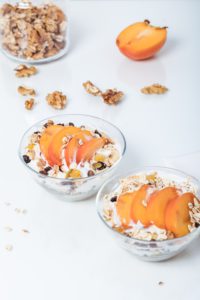
Eating the right food and at the right times is essential when you run and you wish to lose weight.
Before your run, you’ll need to have eaten something that will give you enough energy, but without any bloating, cramps or unwanted toilet stops on the road. Keep in mind that a big meal needs longer to digest than a smaller meal. It’s advisable to eat at least 30-60 minutes before you head out. So plan your meals and your training schedule.
After a run, when you may feel hungry, it is important to refuel to repair muscle tissue and to restock the used-up energy. This will help your body recover and get ready for your next workout.
Choose healthy
Especially before your runs, make sure you choose foods that are easy on your digestive system. Food items that are low in fats & fibers and high in carbs, will give you a lot of energy without upsetting your stomach or intestines.
To fuel your body well before a run, focus on food items that contain “complex” carbs and that are low in fibers and fat. Muesli bars, which often contain a lot of sugar, might boost your energy level before your workout, but fresh items such as fruits and vegetables, nuts, and hummus are a much healthier option as they contain complex carbs that last longer during your run. A bowl of oats with some yogurt and fresh fruits will keep you fuller and will give you longer and more energy. And best of all: it isn’t a threat to your weight loss plan.

After your workout, it’s recommended to take a protein-rich snack. This will stimulate recovery and enhance performance during your next workout. A protein shake is usually made of whey protein powder mixed with water or milk. This is a very popular after-workout drink amongst athletes. Instead, you could also take a cup of greek style yogurt with fresh berries or a boiled egg or some homemade trail mix, with a variety of nuts and seeds.
Working out on an empty stomach?

If you prefer to do your runs in the early morning you need to make sure your breakfast is digested before your workout. So plan ahead and wake up early enough. But in the case of an easy workout (maximum one hour), it is not harmful to go running on an empty stomach, as long as you keep yourself well hydrated. For a longer training session or more intense workout, fuelling up before the run is essential, so you’ll need to set your alarm earlier. Without some pre-run food, you’ll fatigue much faster and it will be a lot tougher to meet your goals (pace, distance, time records).
Intermittent fasting and running
You’ve probably heard of Intermittent Fasting. Many people have chosen this lifestyle which involves alternating cycles of fasting and eating as it may help the body burn more body fat.
With intermittent fasting, you consume all your meals within a specified time window and no food is allowed during the fasting period. During fasting, you may drink to stay hydrated (water, black coffee, or tea only, all without any sugar, honey, sweeteners, or milk). Many Intermittent fasting programs advise people to cut down on carbs as well.
But If you wish to combine running and intermittent fasting to lose weight, it will be extra important to not go too low on the carbs. Runners need to maintain a balanced diet: a mix of all the nutrients included (complex) carbohydrates! You just have to avoid carbs like sugar.
In order to allow our bodies to thrive during a period of famine, all sorts of hormone levels and cellular repair processes in the body change. Intermittent fasting doesn’t demand a crash diet or cutting down your calories to an extreme minimum, which would be very unhealthy. In fact, you should keep your diet balanced and your calorie intake will be enough to keep you energized.
Intermittent fasting can help you burn fat more easily and help you lose weight, because:
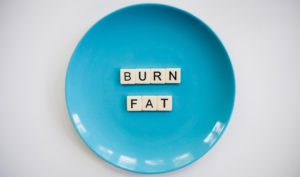
- it can help decrease insulin levels. Insulin triggers your body to either store or break down fats. So it’s important to keep your insulin level low.
- it can boost human growth hormone levels in your blood. These hormones promote fat burning, but also preserve muscle mass.
- it can increase the levels of a stress hormone, called norepinephrine, which improves alertness and attention. An increase generally leads to larger amounts of fat becoming available for your body to burn.
Intermittent Fasting methods
There are several Intermittent Fasting methods with different durations of eating & fasting windows. If it’s new to you, please have a look at this book:
I recently started Intermittent Fasting myself to keep my bodyweight steadier.
For me, the 16/8 IF system works perfectly, because this eating/fasting cycle matches best with my work & family life. It basically means alternating 16 hours of fasting with an 8 hours eating window. I eat between noon and 8 pm and I don’t eat after 8 pm until noon the next day. I do my IF only on weekdays when I usually do my shorter runs (max 1 hour), my gym training, or yoga sessions in the early morning before I start my working day.
This means I do these weekdays-workouts on an empty stomach. After waking up I start the day with one or two glasses of water and I might have a cup of black coffee. Then I head out. I haven’t experienced any lack of energy to finish my workout on an empty stomach.
During my first week of Intermittent fasting, I was counting the hours until I could start eating again, though. But later on, the fasting became “normal” and nowadays I don’t even feel any craving symptoms at all. My body has adjusted to the eating/fasting schedule and it can easily “wait” until my eating window starts.
On Saturdays and Sundays, when I usually have planned my long runs, I‘ll have breakfast before I head out for a run. The weekend mornings are usually also nice family moments to catch up with each other and to share some quality time. Intermittent fasting on just the weekdays works well for me, as it balances out my (sometimes not so healthy) weekends. This way I can keep my bodyweight steady.
Would you like to start running too?
Don’t wait until the time is right. Get the right running shoes to prevent injuries and just do it! Have a look at these books for some inspiration and guidance:
Running is a beautiful sport, and anyone can do it anytime, anywhere. Even if you’ve never ran before. Just get started and find the way that suits you best. Maybe you’ll even learn to love it! And yes, running can help you lose weight as well, as long as your diet is balanced and well-timed. Changing your lifestyle can be a bit overwhelming though, but there is plenty of help and support out there! I hope this article has guided you in the right direction. Let me know if you have any questions or if you‘d like to share your own running and weight loss story. You can send me an e-mail at an*******@mo*********.com or leave your comment below and I will get back to you.
BMI calculator
| require | require |
Your BMI is......
| BMI | Classification |
|---|---|
| less than 18.5: | Underweight |
| 18.5 - 24.9: | Normal weight |
| 25 - 29.9: | Overweight |
| 30 - 34.9: | Class I Obese |
| 35 - 39.9: | Class II Obese |
| 40 upwards: | Class III Obese |

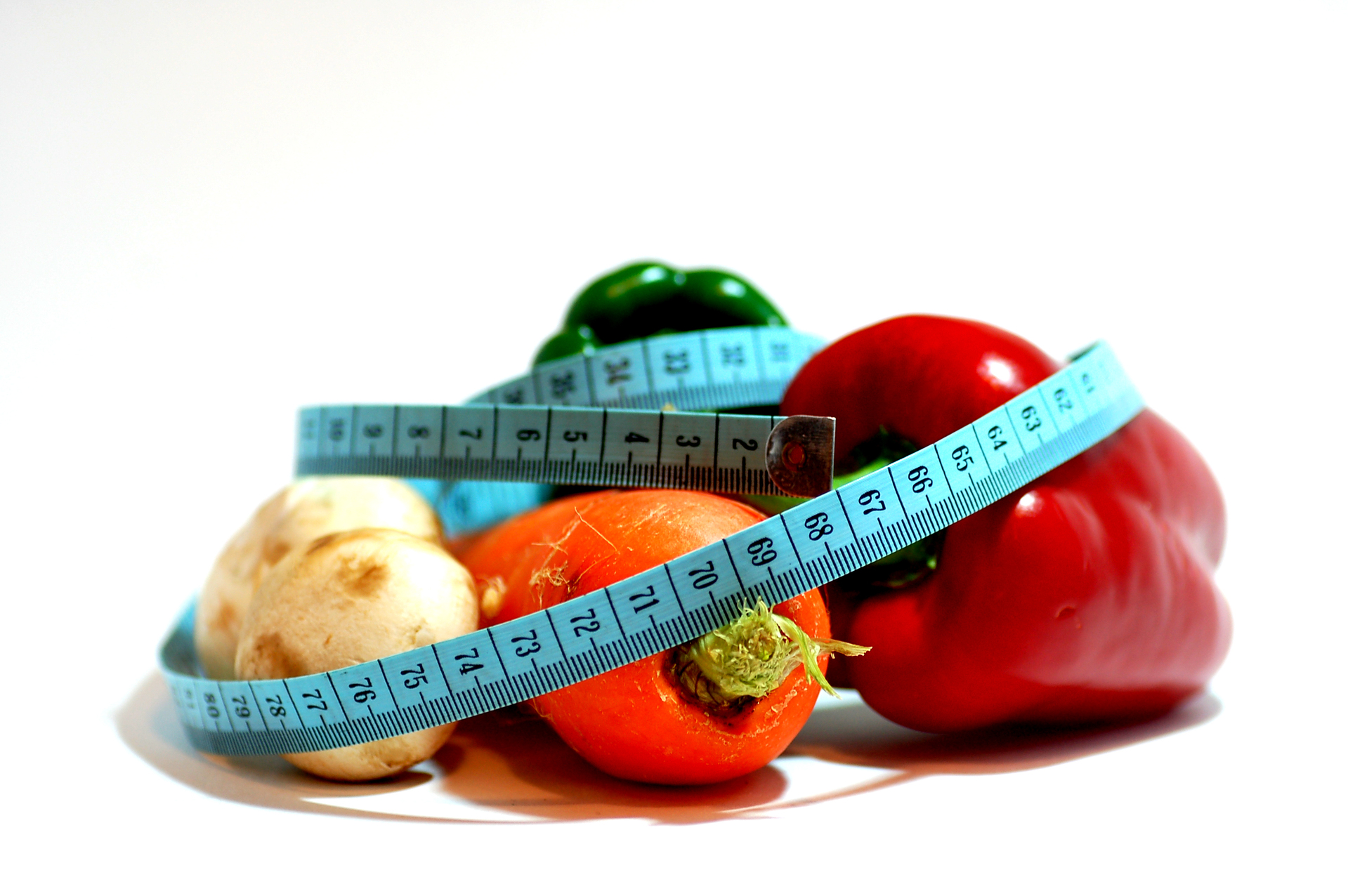

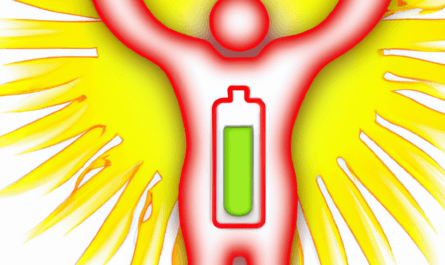


Hi Angelique,
Very interesting article about loosing weight in combination with running.
The intermittent fasting works very good. And as you mentioned in the beginning it’s difficult, but after a week or so it feels normal.
I’m looking forward to next blog.
Thank you for your comment Ellen. Do you combine IF with exercising as well? How do you feel when you workout on an empty stomach?